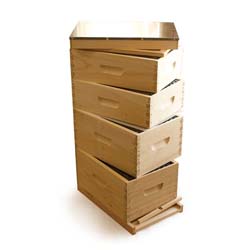Deciding when to harvest honey is a decision that involves a lot of factors. The most important one is whether or not you have hives that have overwintered. If your hive has not overwintered before, it is highly recommended not to take honey from them. If you have colonies that have survived a winter, your next important factor is where in the world your hives are located because of the climate.
You can harvest at just about any point in the season, especially if you are looking for a specific flavor profile. Spring honey is more likely to be made of nectar from trees, which is light and sweet. Fall honey can be made mostly from goldenrod and buckwheat, which are much more bitter tasting honeys. The challenge is timing your harvest just right to allow your honey to be capped enough but for there to be enough of a nectar flow left for your bees to restore some of their honey stores.
Typically, honey is harvested in late summer to early fall. This gives a nice cushion for the bees to have stored a good amount of capped honey while leaving them with enough time to build enough stores to get them through the winter. When harvesting, no matter the point in the season, your honey frames must be 75% capped.
Harvesting honey too early can cause issues with spoilage or fermentation because the honey has too high of a moisture content. A moisture content of 16-18% is generally what beekeepers look for. Any higher and you run the risk of spoilage or a looser viscosity.
Harvesting honey too late could cause a lot of issues for your bees. The first, and most important one, is that it could cause your bees to not have enough honey stores for the winter. To overwinter, a colony needs 60-80 pounds to survive until spring. Timing honey harvest is important – you want them to have enough honey for you to take but to give them enough time to replenish their stores for winter.
Pulling honey too late in the season can also trigger a robbing effect through your hives. When resources are scarce in the fall, the scent of honey in the air could entice robbers into your apiary and leave your bees with no honey.
For best results, familiarize yourself with local flora and their bloom times. Knowing what will bloom throughout the year and what they’ll be collecting can be very advantageous knowledge for a beekeeper!
